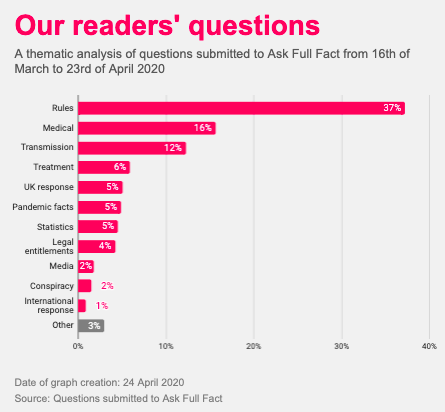What do our readers’ questions tell us about the public’s coronavirus concerns?
Starting on the 16th of March, we gave our readers and site visitors the chance to share their questions about the new coronavirus. We wanted to understand what concerns them, and make sure that our efforts to tackle bad information about the coronavirus were addressing people’s worries. In a little over a month, we received over 2,400 submissions.
We were humbled by the trust they placed in us. And though we could not answer every question directly, we did take the time to read them carefully, group them into themes, and make sense of what matters to our audience. This is a summary of our preliminary analysis. It informs the claims we check, the fact checks we publish, and the policy work we do to foster a culture of accuracy.
Join 72,547 people who trust us to check the facts
Subscribe to get weekly updates on politics, immigration, health and more.
Most questions were about behaviour, health, and transmission
The topic we received most questions (37%) about was around behaviour rules during the lockdown. Many members of the public asked us when, how, and how long someone should self-isolate for; or similarly, what exactly they were allowed, and not allowed to do, in line with social distancing recommendations. One variation of this topic in particular, revolved around caring for vulnerable elderly adults, as well as the management of families. Users in this case wanted to know if they could continue their co-parenting duties, if they could continue to see their partners, or even if it was safe to live in shared accommodation.
The second most frequent topic was of a medical nature (16%). Numerous questions here revolved around the interpretation of symptoms, but many of them also wanted to know how pre-existing health conditions shaped their risk of contracting or developing a severe form of Covid-19.
The final in our top three topics was transmission (12%) - questions such as “can I catch coronavirus from”. The most frequent variation on this theme was around catching the virus from other people. Questions in this category asked, for instance, whether the virus travels in smoke from vaping, or from joggers running past. But many users were also interested in interspecies transmission from pets, transmission from deliveries or post, petrol stations, or clothes.
NB: These are not questions we can always answer. Medical professionals are best placed to address inquiries about health and susceptibility to illness, and the government remains the authoritative source for recommendations on behaviour rules during the lockdown. Nonetheless, the frequency of these questions did reveal one thing. Good information is not just about evidence-based recommendations. It is also about making those recommendations clear, evident, and visible enough to reach the public at a time of information overload.

False treatments
Around one in twenty questions (6%) asked whether a substance could be used to treat Covid-19 or conversely, whether it could aggravate it. Reflecting the intense media attention dedicated to Ibuprofen, the most frequent variation of questions about treatment was around this anti-inflammatory. Similarly, echoing speculations in the media around Hydroxychloroquine, members of the public also asked whether it, and other prescription drugs, could be used to treat Covid-19.
There was also a suite of questions on alternative treatments and homemade remedies. Many members of the public asked about the effects of hot air and hot drinks, the possibility of treating Covid-19 with steam, alcohol, or even a combination of the two, or whether they could prevent it with vitamins and supplements, such as vitamin C. For instance, one reader asked this: "Can a steam inhaler with a few drops of strong whiskey help to kill off the virus that is in the lungs?"
Conspiracy theories
We’ve also seen some questions around conspiracy theories (2%). Most members of the public who touched upon this asked questions about the origin of the virus. Some wondered whether coronavirus was produced in a lab in China or, conversely, whether it was an invention of the US. More recently, we have also seen questions about 5G.
An emerging picture
The topics covered here are just some of the main areas of concern expressed by our readers. They also asked factual questions about the origin, length, spread, and particularities of Covid-19 in relation to the flu, which we labelled as “pandemic facts”, or questions about the collection of data about the number of deaths recorded, or the construction of forecasts, which we labelled “statistics”. In equal measure, readers asked questions about the “UK response” to the pandemic, such as the administration of testing, their “legal entitlements”, such as the right to furlough, as well as particular stories seen in the “media”.
We are continuing to refine this annotation exercise. We hope you find these initial results useful as an indication of the types of questions we are receiving from the public.
A note on methods
This analysis is based on an ongoing annotation exercise led by our research team. As with many annotation exercises, it is imperfect, and we are regularly working on refining the themes. It is also important to remember that this is not a representative sample of the British public.
Learn more about our research work, and the evidence on belief formation.
Check out some of our answers to the questions
We have started to address several of the main themes flagged by users. Have a read of our piece on transmission, where we review the evidence on catching coronavirus from your pets, our piece on the differences between Covid-19 and influenza covering the frequent comparison question about the pandemic, or read our article on the UK government’s testing targets. For the deep dive into the 5G conspiracy theory, check out the history of this sticky myth.
Other claims we’ve been able to address from our readers in the last few weeks include: